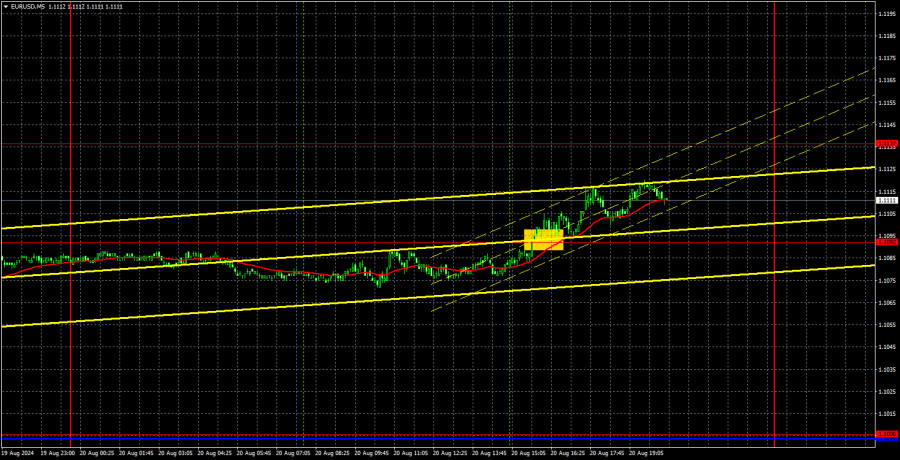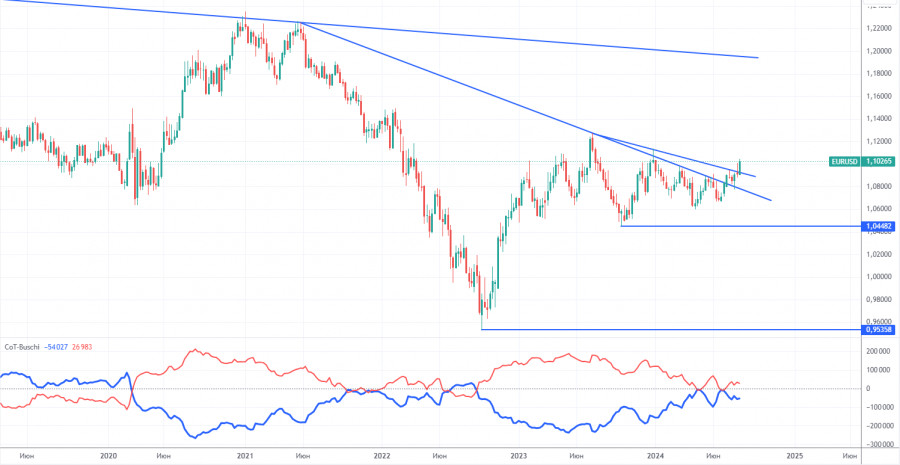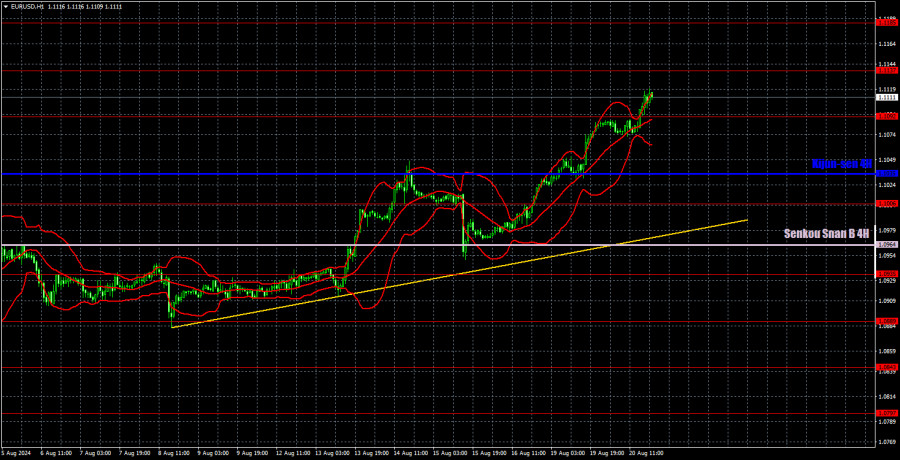Analysis of EUR/USD 5M
On Tuesday, the EUR/USD pair continued its upward price movement. During the day, only one macroeconomic report was released, which had no impact and could not have influenced the currency pair's movement. The second estimate for July was published, identical to the first. Inflation increased by 2.6% year-over-year, which the market was already aware of without the latest report. Thus, yesterday's rise of the euro was unrelated to this report. In fact, the euro has been rising at all hours of the day and night, on any day, even when there are no fundamental or macroeconomic events. This current surge in growth is entirely irrational.
The only question that should concern traders now is how much longer this relentless rise in the euro will continue. Trading bullish currently seems easy, straightforward, and convenient, but only at first glance, as traders probably realize that the euro is rising for no apparent reason. Consequently, this movement could end at any moment. Buying a currency when you don't know why it's rising is not ideal. Nevertheless, there are still no signs of the uptrend ending, and the price could continue to rise with targets at 1.1137 and 1.1185.
On Tuesday, only one trading signal was generated—at the beginning of the US trading session, the level of 1.1092 was surpassed. By the end of the day, the euro rose by just 15 pips, but volatility is currently low, and the movement is one-sided. It is quite reasonable to stay in this trade on Wednesday.
COT report:
The latest COT report is dated August 13. The illustration above shows that the net position of non-commercial traders has been bullish for a long time and remains so. The bears' attempt to move into their zone of dominance failed spectacularly. The net position of non-commercial traders (red line) has declined in recent months, while that of commercial traders (blue line) has grown. Currently, they are approximately equal, indicating a new attempt by bears to seize control.
We also still do not see any fundamental factors supporting the strengthening of the euro, and technical analysis indicates that the price is in a consolidation phase—in other words, a flat. In the weekly time frame, it is clear that since December 2022, the pair has been trading between levels 1.0448 and 1.1274. In other words, we have moved from a seven-month range into an 18-month one.
At the moment, the red and blue lines are slightly moving away from each other, which indicates that long positions on the single currency are increasing. However, given the flat conditions, such changes cannot be the basis for long-term conclusions. During the last reporting week, the number of long positions in the non-commercial group decreased by 3,600, while the number of short positions increased by 3,000. Accordingly, the net position decreased by 6,600. According to the COT reports, the euro still has the potential for decline.
Analysis of EUR/USD 1H
EUR/USD sustains a steady and measured upward trend in the hourly time frame. Last week, new US inflation reports gave the market another reason to sell the dollar again. This week, the market is anticipating dovish rhetoric from Federal Reserve Chair Jerome Powell. The market has fully seized these opportunities to sell the dollar. We still have the ascending trend line at our disposal, which supports the euro. In principle, none of the indicators currently suggest that the uptrend is ending.
For August 21, we highlight the following levels for trading: 1.0658-1.0669, 1.0757, 1.0797, 1.0843, 1.0889, 1.0935, 1.1006, 1.1092, 1.1137, 1.1185, as well as Senkou Span B (1.0964) and Kijun-sen (1.1035) lines. The Ichimoku indicator lines can move during the day, so this should be considered when identifying trading signals. Remember to set a Stop Loss to break even if the price has moved in the intended direction by 15 pips. This will protect you against potential losses if the signal turns out to be false.
No significant events are planned in the Eurozone on Wednesday. In the US, the release of the minutes from the last Fed meeting, a purely formal document, is the only notable event. Despite this, the euro's rise may continue as it remains unaffected by fundamental factors. Notably, there are no signs of a minor correction in the market.
Explanation of illustrations:
Support and resistance levels: Thick red lines near which the trend may end.
Kijun-sen and Senkou Span B lines: These Ichimoku indicator lines, transferred from the 4-hour timeframe to the hourly chart, are strong lines.
Extreme levels: Thin red lines from which the price previously bounced. These provide trading signals.
Yellow lines: Trend lines, trend channels, and other technical patterns.
Indicator 1 on COT charts: The net position size for each category of traders



























